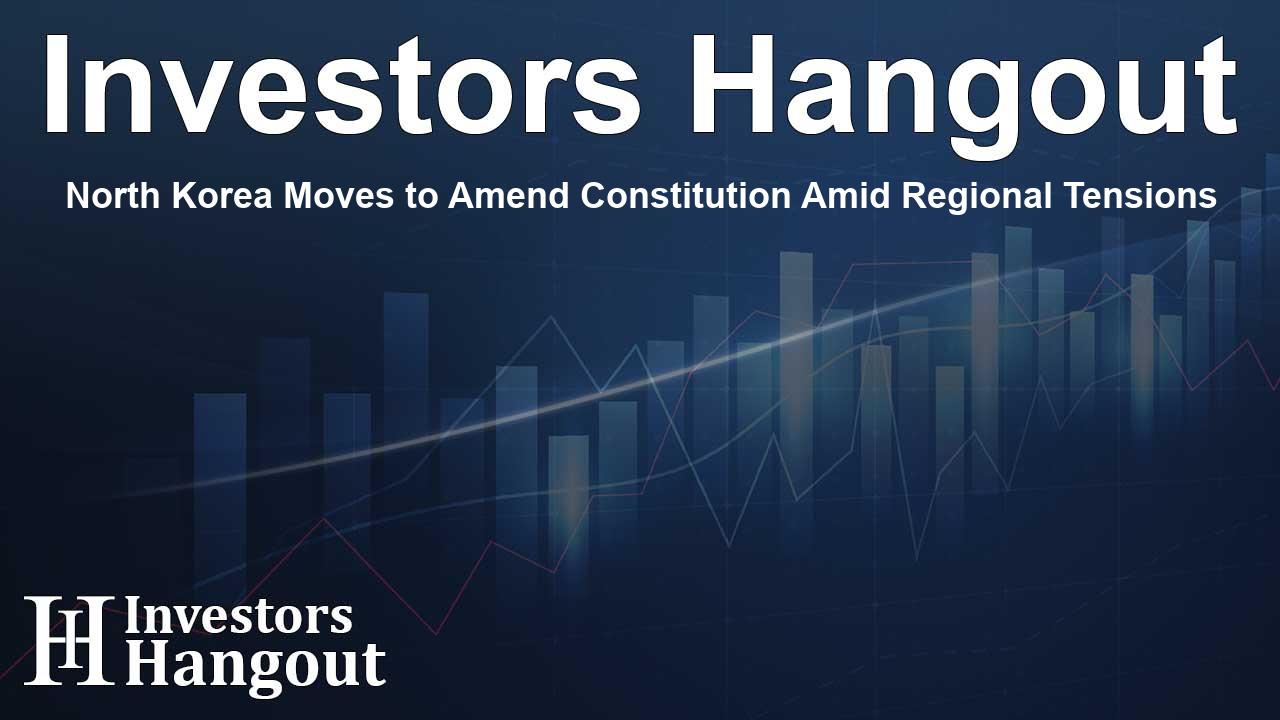North Korea Moves to Amend Constitution Amid Regional Tensions

North Korea’s Strategic Amends to the Constitution
North Korea is on the brink of a pivotal parliamentary session where significant changes to its constitution are set to take place. The focus of these amendments will be the removal of unification clauses that have historically defined its position towards South Korea. This bold directive comes directly from Kim Jong-un, signifying a shift in North Korea's political landscape.
Details of the Parliamentary Session
The upcoming session marks the 11th meeting of the 14th Supreme People's Assembly (SPA). It is noteworthy that this session occurs roughly nine months after Kim Jong-un openly labeled South Korea as North Korea's “invariable principal enemy.” These remarks have led analysts to anticipate substantial decisions during the assembly. The results of this important session are expected to be announced shortly after.
Context of the Changes
Previously, Kim had characterized inter-Korean relations as hostile, dismissing any reconciliation efforts. This meeting is projected to last at least two days, with a high likelihood of amendments that eliminate references to unification and solidify territorial claims. Observers from South Korea's unification ministry have expressed concerns about ambiguous definitions of maritime borders, which could inadvertently escalate tensions.
Possible Outcomes and Future Implications
Experts speculate that North Korea might proactively declare a new maritime boundary that extends south of the current Northern Limit Line (NLL). This declaration could pave the way for more assertive territorial claims and potential conflicts with South Korean forces. Moreover, the assembly might also ratify a new partnership treaty with Russia, potentially including a mutual defense clause following Kim's summit with Russian President Vladimir Putin earlier this year.
Regional Reactions and Concerns
The constitutional developments in North Korea come at a time of intensifying geopolitical tensions within the region. South Korean President Yoon Suk Yeol has recently commented on the likelihood of Kim’s nuclear threats as strategic posturing aimed at drawing attention from the United States in light of upcoming elections. There is a prevailing expectation for North Korea to engage in provocations such as nuclear tests and long-range missile launches in the near future, as Yoon emphasizes the critical nature of North Korean disarmament at upcoming international gatherings.
Internal Dynamics in North Korea
Alongside these external pressures, internal dissent appears to be growing within North Korea. The recent high-profile defection of a North Korean soldier underscores the mounting dissatisfaction among the populace despite Kim’s attempts to maintain tight border controls. The increase in defections, particularly among North Korea’s more privileged classes, suggests that challenges to Kim's regime could be on the rise, indicating potentially destabilizing consequences for the leadership.
Understanding the Broader Implications
The move to amend the constitution not only reflects North Korea's internal ambitions but also the broader implications for regional security. As these changes unfold, neighboring countries and international observers will be closely monitoring how this development influences inter-Korean relations and global diplomatic dynamics in the region. The strategic realignment could provoke varied responses from regional powers, further complicating the geopolitical landscape.
Frequently Asked Questions
What changes is North Korea planning to make to its constitution?
North Korea aims to remove clauses related to unification and clarify territorial boundaries during a forthcoming parliamentary session.
How is this related to Kim Jong-un's view of South Korea?
Kim Jong-un has labeled South Korea as North Korea's principal enemy, which will influence the nature of constitutional changes.
What are experts anticipating from the parliamentary session?
Experts predict potential amendments that could escalate tensions, including new territorial claims south of the Northern Limit Line.
How have internal dynamics in North Korea changed recently?
There is increasing internal discontent, evidenced by defections, suggesting a growing instability within the regime.
What could be the international implications of these changes?
The alterations to the constitution may complicate regional security dynamics and heighten tensions with neighboring countries.
About Investors Hangout
Investors Hangout is a leading online stock forum for financial discussion and learning, offering a wide range of free tools and resources. It draws in traders of all levels, who exchange market knowledge, investigate trading tactics, and keep an eye on industry developments in real time. Featuring financial articles, stock message boards, quotes, charts, company profiles, and live news updates. Through cooperative learning and a wealth of informational resources, it helps users from novices creating their first portfolios to experts honing their techniques. Join Investors Hangout today: https://investorshangout.com/
Disclaimer: The content of this article is solely for general informational purposes only; it does not represent legal, financial, or investment advice. Investors Hangout does not offer financial advice; the author is not a licensed financial advisor. Consult a qualified advisor before making any financial or investment decisions based on this article. The author's interpretation of publicly available data shapes the opinions presented here; as a result, they should not be taken as advice to purchase, sell, or hold any securities mentioned or any other investments. The author does not guarantee the accuracy, completeness, or timeliness of any material, providing it "as is." Information and market conditions may change; past performance is not indicative of future outcomes. If any of the material offered here is inaccurate, please contact us for corrections.